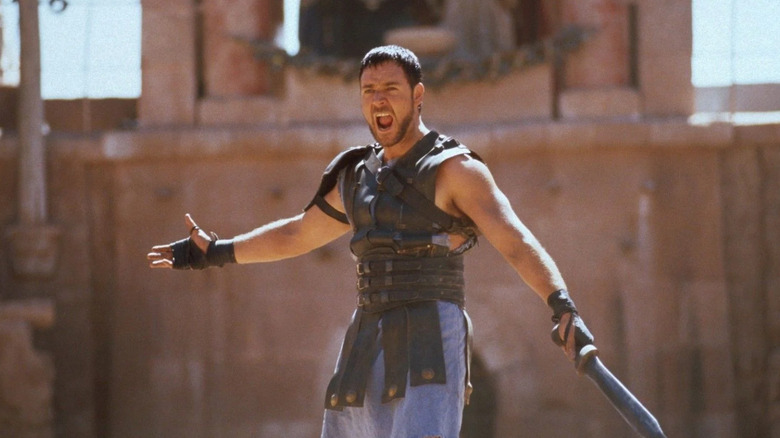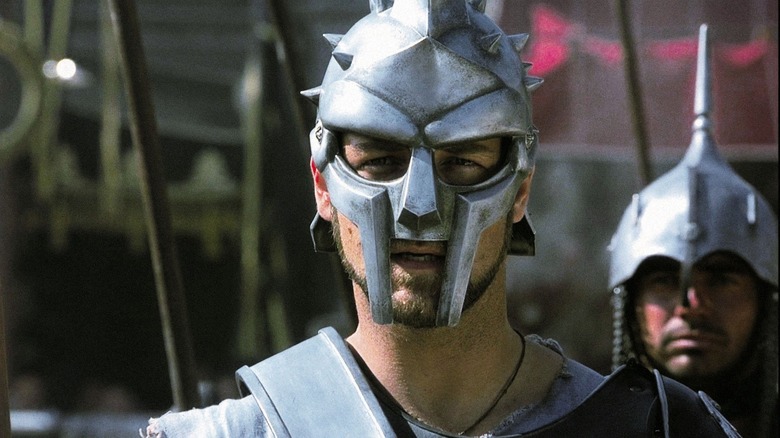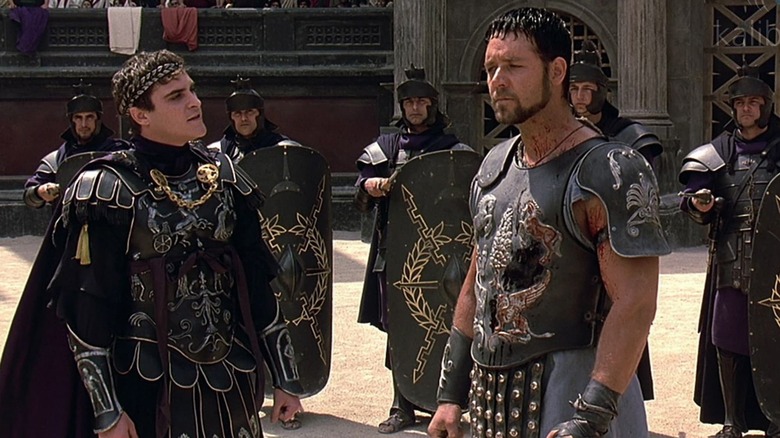Russell Crowe Thought The Original Gladiator Script Was 'Absolute Rubbish'
The success of Ridley Scott's 2000 battle epic "Gladiator" might be seen as a little baffling. The film was nominated for 12 Academy Awards in the early months of 2001, and would win Best Picture, Best Actor, Best Costumes, Best Sound, and Best Visual Effects. This was in spite of the film receiving only vaguely positive reviews from most critics (it currently holds an 80% approval rating on Rotten Tomatoes). Stephen Hunter, in his review in the Washington Post, called the film a disappointment, and the L.A. Weekly's Manhola Dargis called it "ultimately pointless." Roger Ebert gave the film a mere two stars. Overall, "Gladiator" is something of a slog, featuring a dishwater-dull color palette and a perfunctory story that offers little drama and no surprises. These days, "Gladiator" occasionally pops up on lists of the worst Best Picture winners.
"Gladiator" was, however, a massive hit, so it clearly tapped into a pulpy pop sensibility that a mass audience enjoyed. It would ultimately earn half a billion dollars worldwide. Because of this, ideas for sequels have floated through Hollywood for the last two decades, despite the lead character Maximus (Russell Crowe) dying at the end. In 2006, one might have heard the rumors that Nick Cave had written a follow-up wherein Maximus was resurrected to kill Jesus Christ (!), and would henceforth be cursed to eternal life. That film would have ended in the modern day. In 2001, Timur Bekmambetov directed a low-budget peplum film called "The Arena" which was released as "Gladiator 2" overseas. It was not official.
Crowe himself seemed wary of "Gladiator." It netted him an Oscar and made millions, but he recalls, back in 2000, being baffled and put off by the film's script. He expressed his entire thoughts in a video interview with Variety.
'What the f*** is all this?'
Crowe begins the video interview very positively about "Gladiator," however. While he may have had trepidation, he recalls his first time seeing the film with a big crowd and recalling their excitement, as well as their outrage when his character was killed at the end. He knew it was going to be a big hit.
But during production, Crowe was not so thrilled. Mostly because the screenplay, credited to John Logan, David Franzoni, and William Nicholson, simply wasn't very good. He knew he was able to headline a major studio release, but he recognized that the dialogue was terrible. In his words:
"I was confident about my abilities as a leading man. What I wasn't confident about with 'Gladiator' was the world that was surrounding me. At the core of what we were doing was a great concept but the script, it was rubbish, absolute rubbish. And it had all these sorts of strange sequences."
He recalls a scene wherein chariot racers were depicted riding vehicles emblazoned with then-modern product placement logos, like olive oil manufacturers. It may have been accurate to the film's A.D. 180 timeframe, but Crowe thought it would look too contemporary for audiences in 2000. It took Scott to talk Crowe out of abandoning the film altogether. Crowe said:
"That's all true but it's just not going to ring right to a modern audience. They're going to go, 'What the f*** is all this?' The energy around what we were doing was very fractured. I did think a couple times, 'Maybe my best option is just to get on a plane and get out of here.' It was my continued conversations with Ridley that sort of gave me faith."
Rewriting on the fly
As happens with many major Hollywood productions, "Gladiator" underwent massive re-writes while shooting was already underway. When production began, Crowe felt that only a small portion of the final script was poised to make a good film. The rest had to be reworked, using ideas from various screenwriters, the director, and the star. It seems, evevtually, they reached a point where Crowe was comfortable. Scott was a savvy enough director to allow for massive changes, and seemed nimble to pivot. Crowe said:
"[Scott] said to me at one point in time, 'Mate, we're not committing anything to camera that you don't believe in 100%.' So when we actually started that film, we had 21 pages of script that we agreed on. A script is usually between 103 or four or 110 pages. So we had a long way to go and we basically used up those pages in the first section of the movie. So by the time we got to our second location, which was Morocco, we were sort of catching up."
The final film may not have been as widely embraced by critics as it might have been, but when Crowe heard those cheers with his first crowd, all seemed to fall into place. Once finished, both Crowe and Scott immediately ran off to other projects. Crowe was in "Proof of Life," "A Beautiful Mind," and "Master and Commander: The Far Side of the World" within the next three years, and Scott directed both "Hannibal" and "Black Hawk Down" in 2001 alone. That "Gladiator" was a massive success and an Oscar darling seems to have been a lucky happenstance for two filmmakers who were constantly on the move.


